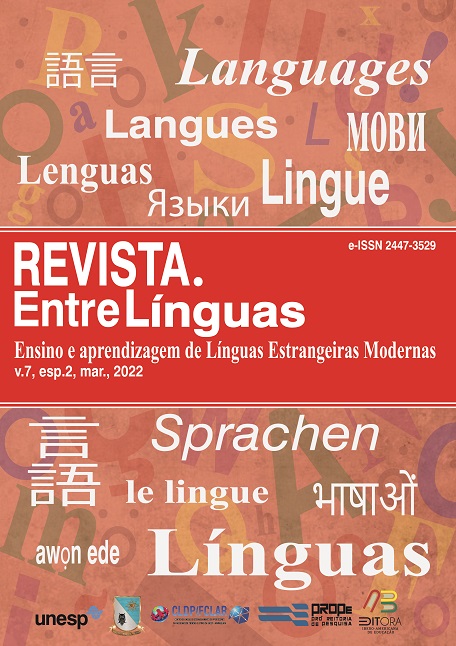A diagnosis of the levels of development of Higher Education students' cognitive activity in the process of learning a foreign language using ICT during practical classes
DOI:
https://doi.org/10.29051/el.v8iesp.2.17310Keywords:
Diagnostics, ICT, Foreign language, Foreign language competence, Cognitive activityAbstract
The article covers the issues of diagnosing the levels of development of the higher education students' cognitive activity in the process of learning a foreign language using ICT. Diagnosis allowed studying the level of students' motivation to learn a foreign language, as well as to determine the students' attitude to using ICT during the foreign language practical classes. Priority forms of conducting foreign language practical classes for students have been identified. Based on Bloom's Taxonomy, a program for using ICT in practical foreign language classes has been developed and outlined. Criteria and indicators for the development of higher education students' cognitive activity in the process of learning a foreign language using ICT are highlighted. The results of the study are described.
Downloads
References
AHMAD, M. et al. The Impact of Integrating ICT in Malay Foreign Language Teaching and Learning. Journal of Physics: Conference Series, v. 1793, 012070, 2021. Available in: https://iopscience.iop.org/article/10.1088/1742-6596/1793/1/012070. Access in: 26 May 2022.
BAKIEVA, G. Kh.; MURADKASIMOVA, K. Sh. Enhancing ICT Technologies in Teaching, Learning and Assessment of foreign languages in Uzbekistan. In: INTERNATIONAL CONFERENCE ON INFORMATION SCIENCE AND COMMUNICATIONS TECHNOLOGIES, ICISCT, 2019, Tashkent. Annals […]. Tashkent, Uzbequistão: IEEE, 2019. Available in: https://ieeexplore.ieee.org/document/9012017. Available in: 17 May 2021.
BARR, D. Students and ICT: An analysis of student reaction to the use of computer technology in language learning. IALLT Journal of Language Learning Technologies, v. 36, n. 2, p. 19–38, 2016. Available in: https://journal.iallt.org/article/view/8408. Access in: 17 July. 2021.
BROVKO, K. A. et al. Ethical and behavioral aspects of the influence of social networks on the development of students' cognitive interest in learning a foreign language in a professional direction. Collection of scientific works «Academic studies. Series: Pedagogy», v. 1, p. 3-10, 2022.
BUCUR, N.; POPA, O. Digital competence in learning English as a foreign language–opportunities and obstacles. The 12th international conference on virtual learning, v. 156, p. 257–263, Oct. 2017. Available in: https://www.researchgate.net/profile/Oana-Rica-Popa/publication/320558176_Digital_Competence_in_Learning_English_as_a_Foreign_Language-Opportunities_and_Obstacles/links/59ed9f314585151983ccee18/Digital-Competence-in-Learning-English-as-a-Foreign-Language-Opportunities-and-Obstacles.pdf. Access in: 18 Sept. 2022.
ICTERI is an annual peer-reviewed international Computer Science conference. 2021. Available in: http://icteri.org/icteri-2021/about-us/. Access in: 11 Oct. 2021.
ICISCT. International Conference on Information Science and Communication Technology, 2020. Available in: https://ieeexplore.ieee.org/xpl/conhome/9076090/proceeding. Access in: 11 Oct. 2021.
KOTENKO, O.; KOSHARNA, N.; HOLOVATENKO, T. Pre-service primary school teacher s foreign language training by means of using innovative technologies. In: PAPADOPOULOS, I.; GRIVA, E.; THEODOTOU, E. (ed.). International Perspectives on Creativity in the Foreign Language Classrooms. Nova York: Nova Science Publishers, 2020.
KUDDUS, K.; KHAN, N. M. Attitude of the International Students Towards Integrating ICT in Foreign Language Learning: A Case Study. In: TUBA, M., AKASHE, S., JOSHI, A. (ed.). ICT Systems and Sustainability. Singapore Springer, 2021. Available in: https://link.springer.com/chapter/10.1007/978-981-15-8289-9_66. Access in: 17 Oct. 2021.
KUSHNIR, N. et al. Distance learning technologies in institution of higher education by means of LCMS moodle. CEUR Workshop Proceedings, v. 2732, p. 1152–1163, 2020. Available in: http://ceur-ws.org/Vol-2732/. Access in: 16 May 2022.
PETRYK, L. Efficiency of media tools use by primary school teacher at the foreign languages lessons: from awareness to readiness. Osvitological discourse, v. 3-4, n. 26-27, p. 185-196, 2019. Available in: https://od.kubg.edu.ua/index.php/journal/article/view/628. Access in: 19 Jun. 2022.
PROSHKIN, V.; GLUSHAK, O.; MAZUR, N. The modern trends in future foreign language teachers` training to ICT usage in their future career. The Modern Higher Education Review, v. 2, 2018. Available in: https://edreview.kubg.edu.ua/index.php/edreview/article/view/47. Access in: 08 Jun. 2022.
SOLOMAKHA, А.; KOSHARNA, N. Preparation of future teachers for using digital technologies in the process of early foreign language teaching. Osvitological discourse, v. 3, n. 30, p. 107-122, 2020. Available in: https://od.kubg.edu.ua/index.php/journal/article/view/739. Access in: 21 Oct 2021.
THE World Summit on the Information Society. WSIS, 2021. Available in: https://www.itu.int/net4/wsis/forum/2021/. Access in: 13 Jun. 2022.
ZAKIROVA, D. Y.; HAYDAROV, I. T. The Impact of Integrating ICT in Malay Foreign Language Teaching and Learning. Journal of Critical Reviews, v. 7, n. 5, p. 765-767, 2020. Available in: https://www.researchgate.net/publication/349936507_The_Impact_of_Integrating_ICT_in_Malay_Foreign_Language_Teaching_and_Learning. Access in: 17 Apr. 2021.
Published
How to Cite
Issue
Section
License

This work is licensed under a Creative Commons Attribution-NonCommercial-ShareAlike 4.0 International License.
Os manuscritos aceitos e publicados são de propriedade da Revista EntreLínguas. Os artigos publicados e as referências citadas na Revista EntreLínguas são de inteira responsabilidade de seus autores.
Transferência de direitos autorais – autorização para publicação
Caso o artigo submetido seja aprovado para publicação, já fica acordado que o(s) autor(es) autoriza(m) a UNESP a reproduzi-lo e publicá-lo na EntreLínguas, entendendo-se os termos “reprodução” e “publicação” conforme definição respectivamente dos incisos VI e I do artigo 5° da Lei 9610/98. O artigo poderá ser acessado pela rede mundial de computadores (Internet), sendo permitidas, a título gratuito, a consulta e a reprodução de exemplar do artigo para uso próprio de quem a consulta, desde que haja a citação ao texto consultado. Essa autorização de publicação 328 EntreLínguas, Araraquara, v. 1, n .2, p. 323-328, jul./dez. 2015 não tem limitação de tempo, ficando a UNESP responsável pela manutenção da identificação do(s) autor(es) do artigo. Os artigos publicados e as referências citadas na Revista EntreLínguas são de inteira responsabilidade de seus autores.











